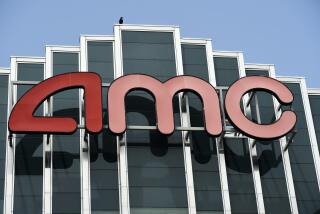MCA Launches an Offensive to Foil Hostile Bids : Holders Given Rights to Discounted Stock if Raider Moves In
- Share via
MCA took forceful steps late Wednesday to ward off an unwelcome takeover attempt but, in a novel move, appeared to leave a door ajar for a friendly, cash-rich suitor.
The action came after a day of tumultuous trading in the Los Angeles entertainment company’s shares, triggered by the three-week hospitalization of Lew R. Wasserman, MCA’s longtime chairman and largest shareholder. Wasserman’s condition led to speculation that a raider would move to seize control.
Although 74-year-old Wasserman returned home Wednesday from Cedars-Sinai Medical Center, that news was not announced until after trading closed on the New York Stock Exchange, where the price of MCA shares rose $2.50 to $57.75. More than 1.68 million shares changed hands, making it the ninth-most active issue traded on the exchange. The closing price established a new 52-week high.
MCA directors apparently huddled all day before issuing a letter to shareholders declaring that they would be given rights that effectively would allow them to purchase a total of 760,000 shares of new preferred stock, “to guard against partial tender offers and other abusive tactics.”
‘Abusive Tactics’ Targeted
In the event of a hostile takeover, the new preferred shares would allow MCA stockholders to buy the raider’s own shares at a deeply discounted price. Even before a merger, if a raider acquired 20% or more of MCA’s stock, MCA stockholders would be able to buy their own company’s common stock at an exceptionally cheap price.
Such a provision, commonly known as a poison pill, is “designed to deal with the very serious problem of another company using abusive tactics to deprive MCA’s board and its shareholders of any real opportunity to determine the destiny of the company,” MCA said in an impassioned letter to shareholders.
At the same time, however, MCA’s board promised to consider any well-financed or cash offer to acquire the company as long as the prospective buyer presents its bid before acquiring more than 1% of MCA’s shares and has obtained an opinion from an investment banker that the bid is fair.
“In a way, this is almost like an invitation: ‘Here’s how a good guy can go about acquiring us,’ ” one analyst mused.
The anti-takeover defenses were put in place in 1985, when shareholders authorized the issuance of up to 25 million shares of preferred stock and voted to increase the number of authorized common shares to 150 million.
The dividend declared Wednesday will entitle shareholders to buy one one-hundredth of a share of a new series of preferred stock at an exercise price of $200. As of March 31, MCA had about 76 million shares outstanding.
Neither MCA President and Chief Operating Officer Sidney J. Sheinberg nor Chief Financial Officer Harold M. Haas could be reached for comment.
Of Hollywood’s six major entertainment companies, MCA has endured longest without a change of controlling ownership. Wasserman has been chief executive for 41 years, with Sheinberg operating in the No. 2 post for the past 14 years. Wasserman owns 6.9% of the company’s shares and serves as a trustee to entities controlling 8.4%.
As a result, Wasserman’s health and estate planning have been fodder for Wall Street speculators as far back as 1969, when he fell ill and an internal power struggle erupted. That year, Wasserman returned to work and consolidated his control, apparently dissuading the late MCA founder Jules C. Stein from selling or merging the firm.
Wasserman’s hospitalization began June 24 at Cedars-Sinai for what was termed routine surgery to remove polyps from his colon. Conflicting stories have swirled about the reasons for the MCA chairman’s protracted hospital stay and his return to surgery last week. On Wednesday, the company said he is “in good condition and is recuperating at home.”
Several Wall Street sources said they have detected no accumulation of shares by a corporate raider.
“I just think it’s traders looking for something. As sure as I’m sitting here, this is not going to be someone making a run at this company,” said an investment banker who specializes in entertainment firms and asked not to be identified. He noted that Wasserman, together with other executives and trusts, controls about 18.5% of the company stock and that, at current prices, the stock price “is not that undervalued.”
But Harold Vogel, a Merrill Lynch analyst, said the company is “indirectly” in play. “It’s not vulnerable tomorrow, but the vultures are certainly looking at it. They’ve been attracted to it,” he said.
Three months ago, when MCA’s stock was trading in the high 40s, several analysts recommended purchase of its shares, on the assumption that MCA’s assets--which range from the second-largest film library and television syndication business to substantial real estate holdings--are worth $60 to $70 per share.
MCA’s trading last Friday set a record for volume when 2.8 million shares changed hands. Perhaps the most active trading before last week occurred on July 3, 1985, when 2.02 million shares of MCA traded on rumors that MCA and RCA were engaged in merger talks. The RCA merger never occurred, however, and MCA has seemingly recommitted itself to aggressive growth, with Sheinberg playing a more visible role.
MCA REAL ESTATE 420 acres in Universal City. Includes 1.5 million square feet of office space in 3 buildings; 33 sound stages; 2 hotels; 3 restaurants; 75-acre Universal Studio Tour; Universal Amphitheatre.
414 acres in Orlando, Fla. Scheduled for development as a film and TV studio attraction.
Music facilities. Includes record pressing and tape production plants in Illinois, New York State, West Germany. Recording studio in Glendale.
Film distribution facilities. Several around the country, plus office building in Toronto.
Retail and mail order facilities. Several offices and warehouses, mostly in New Jersey; 20 acres in Atlantic City, N.J.; many leased facilities.
PROPERTY, PLANT AND EQUIPMENT Dec. 31, 1986
At cost, in millions of dollars
Land $28.3 Buildings and leasehold improvements $313.0 Furniture, fixtures & equipment $219.9 Accumulated depreciation ($235.3) Total $325.9
More to Read
The biggest entertainment stories
Get our big stories about Hollywood, film, television, music, arts, culture and more right in your inbox as soon as they publish.
You may occasionally receive promotional content from the Los Angeles Times.










